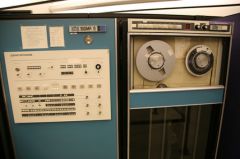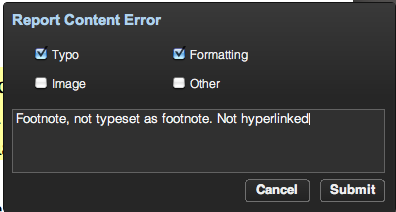
Sometimes people are important to you not for who they are, but for what they do. Michael S. Hart, the founder of Project Gutenberg, is one such person. While I never met him, Michael’s work has definitely impacted my life: The last book I finished ((The Book of Dragons, by Edith Nesbit: highly recommended, especially if you like silly explanations or fairy tales with morals.)), like most of my fiction reading over the past 3 years, was a public domain ebook. I love the illustrations.

The first personal computer: KENBAK-1 (1971)
In 1971, the idea of pleasure reading on screens must have been novel. The personal computer had just been invented; a KENBAK-1 would set you back $750 — equivalent to $4200 in 2011 dollars ((CPI Inflation Calculator)).

Xerox Sigma V-SDS mainframe
Project Gutenberg’s first text — the U.S. Declaration of Independence — was keyed into a mainframe, about one month after Unix was first released ((Computer history timeline 1960-1980)) ((Project Gutenberg Digital Library Seeks To Spur Literacy:
Library hopes to offer 1 million electronic books in 100 languages, 2007-07-20, Jeffrey Thomas)). That mainframe, a Xerox Sigma V, was one of the first 15 computers on the Internet (well, technically, ARPANET) ((Amazingly, this predated NCSA. You can see the building–Thomas Siebel–hosting the node thanks to a UIUC Communication Technology and Society class assignment)). Project Gutenberg is an echo of the generosity of some UIUC sysadmins: The first digital library began a gift back to the world in appreciation of access to that computer.
Thanks, Michael.
Originally via @muttinmall




